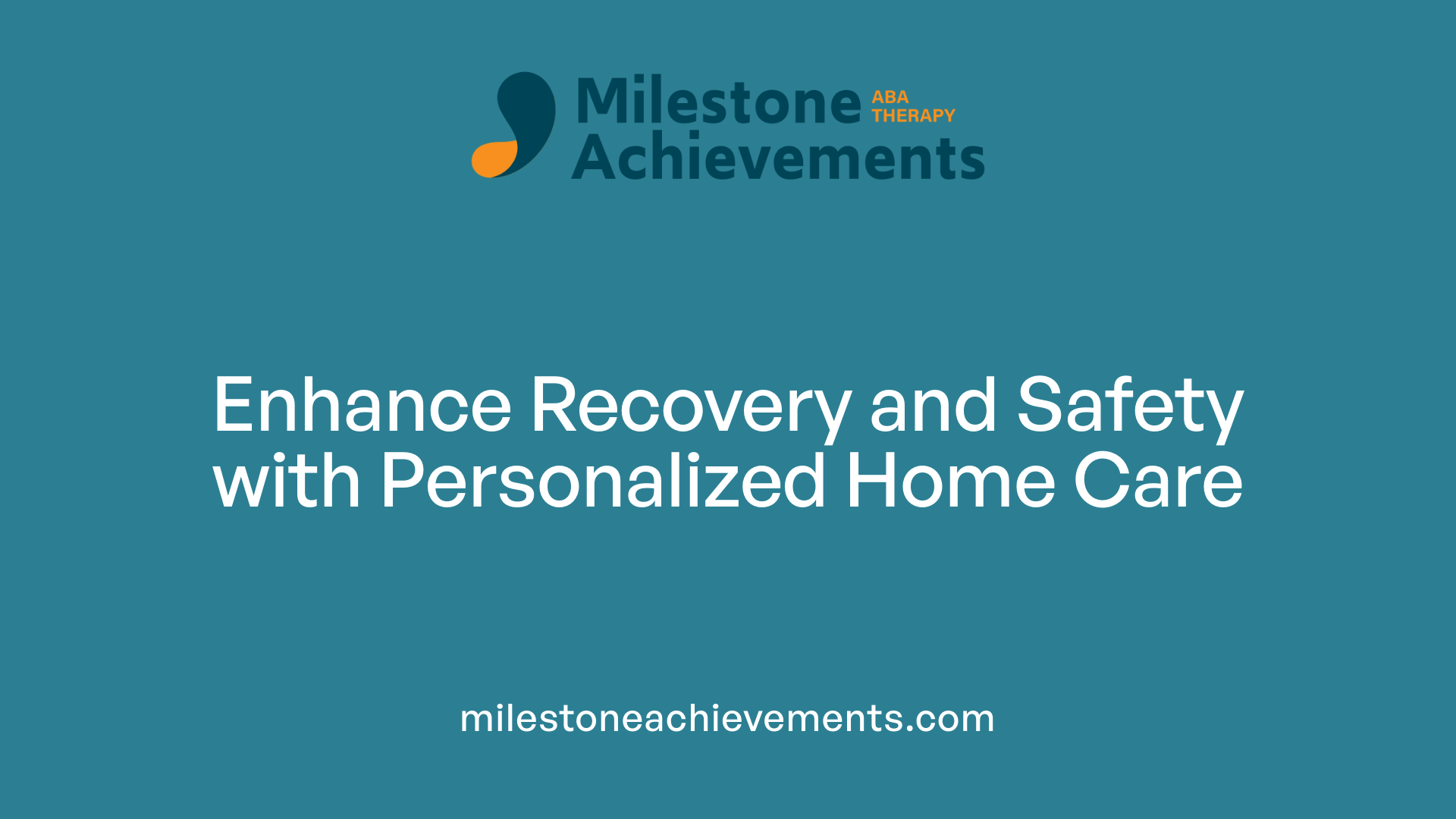
At-Home Therapy: The Benefits of Personalized Support
Transforming Care with Tailored Home-Based Support
Embracing Personalized Support in the Comfort of Home
In recent years, the landscape of healthcare and therapy has shifted toward a more personalized, home-centered approach. At-home therapy and support services are redefining how individuals with diverse needs—whether developmental, physical, or mental—receive care. By leveraging tailored treatment plans within familiar environments, these services significantly enhance outcomes, safety, and quality of life. This article explores the multifaceted benefits of personalized in-home therapy, detailing various options, their unique advantages, and how they compare to traditional clinical settings.
Benefits of At-Home Therapy and Support Services

What are the benefits of at-home therapy and support services?
At-home therapy and support services provide a range of advantages that contribute to more effective and personalized care. One of the primary benefits is the ability to tailor interventions specifically to the individual’s needs and environment. Since therapy is conducted in the familiar surroundings of the home, it often results in better comfort levels, reduced anxiety, and a more natural setting for practicing new skills.
These services also enhance convenience and accessibility. Families can avoid the stress and logistical challenges associated with traveling to clinics, making it easier to schedule regular sessions that fit seamlessly into daily routines. This flexibility can lead to more consistent participation and progress.
By observing daily routines, family dynamics, and environmental factors directly, therapists can develop interventions that are highly relevant and effective. Family members, including parents and siblings, are encouraged to be involved, which helps reinforce skills outside of therapy sessions and promotes generalization of progress.
Safety and independence are further supported through these personalized services. Therapists can focus on real-life challenges faced by the individual, helping them develop skills that foster safety, enhance autonomy, and maintain long-term improvements. Overall, at-home therapy integrates support into the person's daily life, fostering sustainable growth and well-being.
In summary, at-home therapy offers personalized, comfortable, and convenient support that addresses individual needs within their natural environment, driving more meaningful and lasting outcomes.
Personalized Support in Home-Based Therapy and Its Impact on Care
How does personalized support in home-based therapy improve care?
Personalized support in home-based therapy significantly enhances the quality and effectiveness of care by customizing interventions to meet each individual’s specific needs, preferences, and environment. This approach ensures that therapies are relevant and meaningful, leading to more engaged participation and better outcomes.
Therapists conduct thorough assessments within the home, allowing them to observe daily routines, interactions, and environmental factors that influence behavior and progress. Such real-life observations provide crucial insights that guide tailored treatment plans, making interventions more practical and feasible.
One of the major advantages of home-based therapy is increased accessibility. Families facing barriers like transportation difficulties, mobility issues, or scheduling conflicts find it easier to participate consistently when services are provided at home.
Family involvement is another vital aspect. Caregivers and family members observe sessions, learn strategies, and actively reinforce skills between sessions. This continuous support helps sustain progress and generalizes learned behaviors to everyday situations.
The flexible nature of in-home therapy allows for ongoing adjustments. Care plans can be revised as a child's needs evolve, ensuring that treatment remains responsive and effective.
Overall, personalized home-based therapy creates a comfortable, familiar setting that nurtures quicker relationship building, facilitates natural skill development, and improves quality of life for individuals receiving care.
Variety of In-Home Health Care Options and Their Benefits
 What are the different options for in-home health care?
What are the different options for in-home health care?
In-home health care encompasses a variety of services tailored to support individuals with medical and daily living needs within the comfort of their own homes. Medical services are often delivered by licensed professionals such as registered nurses, physical therapists, occupational therapists, and speech-language pathologists.
These healthcare providers offer therapeutic interventions like physical therapy to improve mobility, occupational therapy to enhance daily functioning, and speech therapy to address communication and swallowing issues. They also perform medical management tasks such as wound care, medication administration, vital sign monitoring, and managing chronic conditions, often following physician prescriptions.
In addition to medical treatments, medical social services are available, including counseling to address emotional or psychological challenges and resource assistance to connect families with community services or financial support.
Beyond medical interventions, in-home care can include non-medical support services like personal care (assistance with dressing, bathing), household chores, companionship, and respite care. These services aim to improve overall quality of life, promote independence, and reduce caregiver stress.
The scope and availability of these options depend on individual healthcare requirements, insurance coverage, and eligibility. Coordination with healthcare providers ensures a comprehensive approach that meets each person's unique needs, supporting health and well-being right at home.
| Service Type | Description | Typical Providers |
|---|---|---|
| Skilled Nursing | Medical care including wound management, medication | Registered nurses, licensed vocational nurses |
| Physical Therapy | Improving mobility, strength, and balance | Licensed physical therapists |
| Occupational Therapy | Enhancing daily living skills and safety | Occupational therapists |
| Speech Therapy | Addressing speech, swallowing, and cognitive issues | Speech-language pathologists |
| Medical Social Services | Counseling, resource navigation | Licensed social workers |
| Non-Medical Support | Personal care, companionship, household help | Home health aides, care companions |
This comprehensive range ensures individuals receive personalized, effective care tailored to their evolving health needs in the familiar environment of their home.
Supporting Specific Health Needs Through Personalized Home Therapies

How can personalized at-home therapy support specific health needs?
Personalized at-home therapy provides tailored treatment plans that directly address an individual's unique medical conditions, such as multiple sclerosis (MS), autism spectrum disorder (ASD), mental health challenges, or age-related issues. Therapists consider medical history, environmental factors, and personal goals to develop effective strategies that promote recovery, manage symptoms, and improve daily functioning.
These therapies are conducted in familiar surroundings, which can increase comfort and reduce anxiety. By working in the home environment, therapists can monitor progress in real-time and adjust interventions instantly, ensuring continual improvement.
Family involvement plays a vital role in this approach. Caregivers and family members learn how to reinforce skills and implement ongoing strategies, leading to more consistent and sustained progress. Education on injury prevention, medication management, and self-care techniques empowers families to support health maintenance beyond therapy sessions.
Personalized home-based therapies also enhance accessibility and engagement. They reduce the need for travel and provide flexible scheduling, fitting seamlessly into daily routines. Importantly, this individualized approach often results in quicker symptom relief, greater independence, and improved overall health outcomes, making it an ideal option for managing specific health needs at home.
The Role of Personalized Care in Recovery and Safety Enhancement

How does personalized care promote recovery?
Personalized care is crucial in supporting individuals during the recovery process. By developing treatment plans that are specifically tailored to a person’s unique health profile, needs, and goals, care providers can target interventions more effectively. This tailored approach often involves comprehensive assessments, including medical history, genetic information, and lifestyle factors, which help identify potential risks and optimal therapies.
For children receiving home-based ABA therapy, personalized plans ensure that behavioral interventions are relevant and practical, promoting better engagement and faster progress. Similarly, in adult rehabilitation, customized physical or occupational therapy plans focus on the individual's specific impairments and daily activities, empowering them to regain independence efficiently.
How does personalized care reduce risks and prevent complications?
Reducing hazards and preventing complications is a core advantage of personalized care. By continuously monitoring health variables such as vital signs, mobility status, or medication effects, caregivers can detect early signs of issues like falls, medication side effects, or disease progression.
For example, personalized safety strategies include fall risk assessments and tailored home modifications, especially vital for elderly or disabled individuals. These proactive measures help prevent injuries and health deterioration, ensuring a safer environment conducive to recovery.
How is health monitored and care adjusted accordingly?
Ongoing monitoring is vital to adapt therapies as needed. Care plans incorporate regular evaluations, whether through in-home assessments, telehealth check-ins, or wearable technology. This data informs timely adjustments—such as increasing therapy intensity or modifying medication dosages—keeping treatment aligned with the person's evolving condition.
In mental health treatment, personalized approaches often use feedback from digital therapeutics or caregiver observations to refine therapeutic modalities, which accelerates symptom management and minimizes setbacks.
What strategies foster patient empowerment and safety?
Empowerment is achieved by involving patients and their families in decision-making and education about their care plans. Family members receive training to reinforce strategies outside professional sessions, promoting consistency and confidence.
Safety measures include customized emergency response plans, medication management, and adaptive environments designed to reduce fall risks or injury. Care coordination further ensures that all team members are informed and responsive to the changing needs of the individual.
How are the needs of those with chronic conditions or disabilities addressed?
People with chronic illnesses or disabilities benefit significantly from personalized care plans that adapt over time. These plans emphasize sustainable strategies for managing daily activities, medical treatments, and emotional support.
Services may include tailored medication management, mobility assistance, symptom tracking, and emotional well-being support—delivered in a manner that respects personal preferences, cultural backgrounds, and specific limitations. This holistic, flexible approach enhances quality of life and promotes long-term health stability.
| Aspect | Focus | Benefits |
|---|---|---|
| Recovery | Tailored therapies, assessments | Faster progress, higher engagement |
| Safety | Risk assessments, home modifications | Fewer injuries, prevention of complications |
| Monitoring | Continuous data collection, regular reviews | Dynamic care, timely interventions |
| Empowerment | Education, family involvement | Greater confidence, adherence |
| Chronic Care | Ongoing adjustments, holistic support | Stability, improved health and well-being |
Contrasting In-Home Therapy with Traditional Approaches and Its Unique Benefits
How does in-home therapy differ from traditional clinical approaches?
In-home therapy takes place directly in a patient’s familiar environment, such as their home or community, unlike traditional clinical care which usually occurs in hospitals, clinics, or specialized outpatient centers. This setting allows the therapy to focus on practical, real-life goals that directly enhance daily functioning.
Unlike typical outpatient medical visits that mostly address medical or physical conditions, in-home programs like Rehab Without Walls serve individuals who are not necessarily confined to their homes, emphasizing mobility, independence, and community reintegration. These programs often include a collaborative team approach that involves family members and caregivers in the treatment process.
Therapists and physicians actively participate in designing and adjusting personalized care plans that target complex neuropsychological and psychosocial challenges. Sessions tend to be longer and more intensive to foster meaningful progress.
Success in in-home therapy is measured by how well individuals regain independence and incorporate skills into their everyday routines, rather than just medical recovery metrics.
This approach offers tailored care that adapts to each person’s lifestyle, setting it apart from more structured, medical-oriented traditional treatments. The focus on real-world application, family involvement, and flexible scheduling makes in-home therapy a uniquely effective and compassionate alternative to conventional clinical approaches.
Empowering Personalized Care for a Better Life
As healthcare continues to evolve towards more individualized, patient-centered models, in-home therapy and support services stand out as effective, flexible, and accessible options. The emphasis on personalized plans ensures that each person’s unique needs—medical, developmental, or emotional—are prioritized, fostering faster recovery, greater independence, and improved well-being. By integrating these services into daily routines within the comfort of home, individuals can experience not only better health outcomes but also enhanced safety and compassionate support that respects their dignity and lifestyle. The future of care lies in leveraging technology, family involvement, and holistic approaches to create a seamless continuum of personalized support, empowering individuals to live healthier and more fulfilling lives.
References
- The Benefits of At-Home ABA Therapy: Personalized Support in a ...
- The Benefits of In-Home Physical Therapy for Personalized Healing
- The Benefits of Personalized Home Care Services
- Home-Based ABA Therapy: Personalized Benefits for Autism
- Personalized In-Home Care for MS Provides Support for Daily Living
- The Benefits of a Personalized Mental Health Treatment
- Care Coach: A Guide To Personalized Caregiver Support - Trualta
- Comprehensive In-Home Therapy Services - BrightStar Care
- The Importance of Personalized Care Plans when Aging in Place


Partner with us on your child's journey
Milestone Achievements offers evidence-based ABA therapy to help children with autism reach their full potential. Together we’ll set meaningful goals and celebrate progress every step of the way.
Start ABA Services Today





